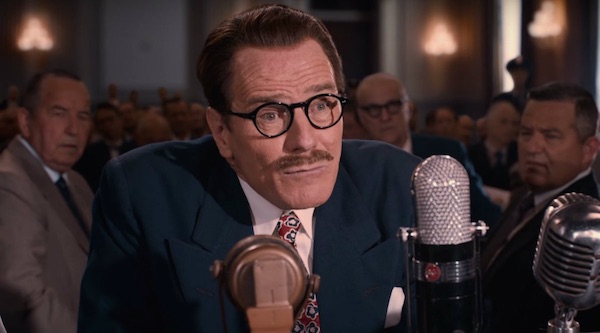Trumbo Review
Posted on December 18, 2015 By John Gilpatrick 2015, Movie Reviews, New Releases
Mistrust and fear overtook Hollywood during the 1940s and 1950s when many major players in the movie industry were shunned, blacklisted, and even jailed over their beliefs. It’s not hard to see why such a time would be appealing to a filmmaker, and in fact, Jay Roach’s Trumbo is hardly the first film to chronicle Hollywood’s particular incarnation of the Red Scare. Of course, On the Waterfront is a very famous allegory for director Elia Kazan’s forced testimony to Congress, and Martin Ritt’s The Front features one of just a few Woody Allen performances in a film directed by someone else. In it, he plays a schmo who poses as a writer so that those blacklisted can still create and get paid.
There’s an element of The Front in Trumbo, as the titular screenwriter of such classics as Roman Holiday and Spartacus must pass off his scripts as belonging to others in order to keep working and providing for his family. But where that film was original, Trumbo is adapted very obviously and formulaically from a man’s life. It’s an entertaining enough film with strong performances and quick, sometimes amusing dialogue, but it’s filmed and structured in too pedestrian a fashion to make much of an impact.
The film opens with Trumbo (Bryan Cranston) professionally and financially on top of the world. He’s just signed the largest studio contract in history for a screenwriter, but with his signature comes a promise to MGM: He’ll cut out all that commie, worker’s rights nonsense that’s been picked up in the news recently. But Trumbo’s blood truly runs red, and despite warnings from both his enemies — including the scandalous Hollywood “journalist” Hedda Hopper (Helen Mirren) — and his family and friends, Trumbo continues his political activities and eventually finds himself testifying before the House Un-American Activities Committee.
From there, it’s a fast spiral downward that includes jail time, loss of livelihood, and betrayal by friends. Trumbo realizes he’s idealistic to a fault, but that doesn’t mean he’ll ever stop fighting for what he believes is right. There’s inherent drama in living life with that sort of mindset, especially when the person in question is someone as creatively brilliant as Dalton Trumbo, but the film’s paint-by-numbers approach to sharing Trumbo’s life and fight with us is a major disappointment. The transitions are a disaster; Every important beat is treated like a major television finale reveal. (“And I’ll call it, The Brave One.”) It literally uses podiums and speeches to make its most important political points. And there’s a serious case of blinders happening on a rather meta level considering how self-congratulatory the film is for Hollywood’s eventually getting this situation right, though it doesn’t quite have the guts to portray John Wayne and others as truly complicit in the extreme censorship of the age. Instead, we’re supposed to laugh at the mimicry on display and say, “Gee, they didn’t know what they were doing, and I’m sure they meant well, so it’s OK.”
For all the film’s faults, however, it’s compulsively watchable — a quality that starts and nearly ends with Bryan Cranston’s exceptional performance. Yes, it’s overly affected and as subtle as a punch in the face, but Cranston delivers his mostly ridiculous lines with the relish they deserve. It’s the perfect performance for what this movie is and wants to be, and it’s not hard to see why he’s become the Best Actor contender du jour.
Helen Mirren is somewhat less successful as Hopper, but perhaps only because the film isn’t named after her, and no one involved seems to know what to do with the character after her first few scenes. Ditto Michael Stuhlbarg as Double Indemnity star Edward G. Robinson, who named names to HUAC in order to clear his own. His arc is one of the film’s few emotionally satisfying ones, even if it ends early and somewhat abruptly.
Watching Trumbo, I couldn’t help but lose myself in the time period (and appropriately flashy period costumes and production design) and amongst its many great actors, but in the wake of Bridge of Spies, another 2015 Cold War movie, I wondered how to favorably compare Trumbo’s blustering sense of morality to the grace and complexity of Steven Spielberg’s film. I had issues with Bridge of Spies, but it’s on another level compared to what Roach has to offer — a mostly clueless film that I enjoyed despite its best efforts to make me feel otherwise.
2015, 3 Stars, Adewale Akinnuoye-Agbaje, Alan Baumgarten, Alan Tudyk, Bryan Cranston, David James Elliott, Diane Lane, Elle Fanning, Helen Mirren, Jay Roach, Jim Denault, John Goodman, John McNamara, Louis C.K., Michael Stuhlbarg, Roger Bart, Stephen Root, Theodore Shapiro, Trumbo


















Pingback: Reviews: Trumbo (2015) – Online Film Critics Society